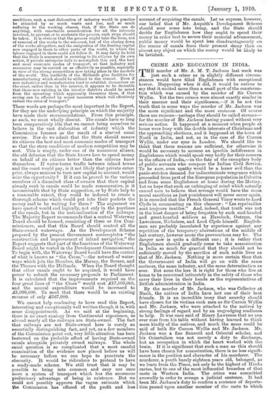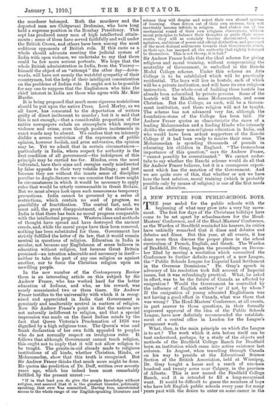CRTMT1 AND EDUCATION IN INDIA. T HE murder of Mr. A.
M. T. Jackson last week was just such a crime as in slightly different circum- stances would have filled. Englishmen with exceptional horror. Happening when it did, it would be untrue to say that it excited more than a small part of the consterna- tion which was caused by the murder of Sir Curzon Wyllie. Yet the two crimes were almost exactly similar in their manner and their significance,—if it be not the truth that in some ways the murder of Mr. Jackson was the more significant and the more ominous. Of course there are reasons—perhaps they should be called excuses— for the murder of Mr. Jackson having passed without very serious notice. It happened at a moment when people at home were busy with the double interests of Christmas and the approaching elections, and it happened. at the town of Nasik in India, and not, as in the case of Sir Curzon Wyllie, under our eyes in London. We should like to think that these reasons are sufficient, for otherwise it would be necessary to assume an ignoble indifference in Englishmen which would speak very badly for their concern in the affairs of India,—in the fate of the exemplary body of public servants who compose the Indian Civil Service. To be sure, even apathy would be a lesser evil than the panic-stricken demand for indiscriminate vengeance which proceeded from part of the European population in Calcutta and from some Englishmen at home during the Mutiny. Let us hope that such an unhinging of mind which actually caused men to believe that revenge would. have the same moral sanctions as just punishment will never occur again. It is recorded that the French General Vinoy wrote to Lord Clyde in commenting on this clamour : " Les represailles sent toujours inutiles." And, indeed, that truth was not in the least danger of being forgotten by such cool-headed. and great-hearted soldiers as Havelock, Outran, the Lawrences, Nicholson, and Lord Clyde himself. English- men are probably inoculated. by experience against any repetition of the temporary aberrations of the middle of last century, however acute the provocations may b.,. The danger now is quite a different one ; it is rather that Englishmen should gradually come to take assassination in India so much for granted that they should not be sufficiently moved by the sacrifice of such noble lives as that of Mr. Jackson. Nothing is more certain than that the Government of India will go on with the same coolness, the same industry, and the same determination as ever. But none the less it is right for those who live at home to be concerned intimately in the safety of those who carry their lives in their hands as the representatives of British administration in India.
By the murder of Mr. Jackson, who was Collector at Nasik, the natives of India have lost one of their best friends. It is an incredible irony that anarchy should have chosen for its victims such men as Sir Curzon Wyllie and Mr. Jackson, who were attached to the natives by strong feelings of regard and by an ungrudging readiness to help. It was once said of Henry Lawrence that no one ever rose from his table without having learned to think more kindly of the natives, and much the same could be said of both Sir Curzon Wyllie and Mr. Jackson. Mr. Jackson was a fine Sanscrit and Oriental scholar, and his Orientalism was not merely a duty to discharge, but an occupation in which the heart worked with the brain. If it is significant that such a man as this should have been chosen for assassination, there is no less signifi- cance in the position and character of his murderer. The murderer, a youth barely eighteen years old, belonged, as we learn from the Times, not only to the highest of Hindu castes, but to one of the most influential branches of that caste in Western India. The crime was committed avowedly in order to avenge a judicial sentence. It had been Mr. Jackson's duty to confirm a sentence of deporta- tion passed upon another member of the caste to which the murderer belonged. Both the murderer and the deported man are Chitpavani Brahmins, who have long held a supreme position in the Bombay Presidency. This sept has produced many men of high intellectual attain- ments ; some of them have served faithfully and well under the British Crown, and others have been among the most seditious opponents of British rule. If this caste as a whole should advocate meeting the judicial system of India with open violence, we undertake to say that there could be few more serious portents. We hope that the whole British administration in India, from the Viceroy— himself the object of an " attempt " the other day—down- wards, will have not merely the watchful sympathy of their countrymen, but the help of their intelligent concentration on the problems of Indian rule. It ought not to be possible for any one to suppose that the Englishmen who take the chief interest in India are those who agree with Mr. Keir Hardie.
It is being proposed that much more rigorous restrictions should be put upon the native Press. Lord Morley, as we all know, has consented to the deportation of writers guilty of direct incitement to murder ; but it is said that this is not enough,—that a considerable proportion of the native newspapers exhale an atmosphere which inspires violence and crime, even though positive incitements in exact words may be absent. We confess that we intensely dislike a severe restriction of the expression of public opinion, however foolish, and even subversive, the opinion may be. Yet we admit that in certain circumstances— particularly in India, where respect for authority is the first condition of all government—the indulgence of this principle may be carried too far. Hindus, even the most cultivated, have their aims and energies easily misdirected by false appeals to their very volatile feelings ; and just because they are without the innate sense of discipline peculiar to Anglo-Saxons we can conceive that there might be circumstances in which it would be necessary to apply rules that would be utterly unreasonable in Great Britain. But we must always look upon such measures as temporary precautions. India cannot be governed by a series of restrictions, which contain no seed of progress, no possibility of fructification. The central fact, and, we must add, the great disappointment, of the situation in India is that there has been no moral progress comparable with the intellectual progress. Western ideas and methods of thought have spread and have destroyed the ancient creeds, and, while the moral props have thus been removed, nothing has been substituted for them. Government has strictly fulfilled the letter of its law, that it would remain. neutral in questions of religion. Education in India is secular, not because any Englishman of sense believes in education without religion, but because Great Britain promised—an intention admirable and necessary in itself— neither to take the part of any one religion as against another, nor to force the Christian religion upon an unwilling people.
In the new number of the Corttemporary Review there is an interesting article on this subject by Sir Andrew Fraser, who has worked hard for the better education of Indians, and who, as his reward, was nearly assassinated two or three times. Sir Andrew Fraser testifies to the universality, with which it is recog- nised and appreciated in India that Government is genuinely and unalterably neutral in matters of religion. Now Sir Andrew Fraser's point is that the natives are not naturally indifferent to religion, and that a special impression was made on the finest Indian minds by the fact that Queen Victoria's Proclamation of 1858 was dignified by a high religious tone. The Queen's wise and frank declaration of her own faith appealed to peoples who do not normally respect an irreligious ruler. It follows that although Government cannot teach religion, this ought not to imply that it will not allow religion to be taught. The grants-in-aid already made to religious institutions of all kinds, whether Christian, Hindu, or Mohammedan, show that this truth is recognised. But Sir Andrew Fraser thinks that much more might be done. He quotes the prediction of Dr. Duff, written over seventy years ago, which has indeed been most remarkably fulfilled_ by the present unrest :—
" If in that land you do give the people knowledge without religion, rest assured that it is the greatest blunder, politically speaking, that ever Ins committed. Having free, unrestricted access to the whole range of our English-speaking literature and science they will despise and reject their own absurd systems of learning. Once driven out of their own systems, they will inevitably become infidels in religion. And shaken out of the mechanical round of their own religious observances, without moral principles to balance their thoughts or guide their move- ments, they will as certainly become discontented, restle::a agitators, ambitious of power and official distinction, and possessed of the most disloyal sentiments towards that Government which, in their eye, has usurped all the authority that rightly belonged to themselves. This is not theory, it is fact."
Sir Andrew Fraser holds that the ideal scheme for giving religious and moral training, without compromising the neutrality of Government, is embodied in the Ranchi Model College scheme. Under this scheme an Arts College is to be established which will be practically residential. The boys will live in hostels, each of which will be a private institution, and will have its own religious instruction. The whole cost of building these hostels has already been subscribed by private persons. Some of the hostels will be Hindu, some Mohammedan, and some Christian. But the College, as such, will be a Govern- ment institution, and there religion will not be taught. The scheme has not advanced very far, although the foundation-stone of the College has been laid. Sir Andrew Fraser quotes as characteristic the cases of a leading Mohammedan and a leading Hindu who intensely dislike the ordinary non-religious education in India, and who would have been ardent supporters of the Ranchi College if it had been ready to receive their sons. The Mohammedan is spending thousands of pounds in educating his children in England. "The tremendous importance of this question," says Sir Andrew Fraser. " cannot possibly be overestimated." We cannot under- take to say whether the Ranchi scheme would do all that Sir Andrew Fraser believes, but it is a courageous experi- ment which has the sanction of the Government. And we are quite sure of this, that whether or not we have here the best solution, moral training (which is probably possible only by means of religion) is one of the first needs of Indian education.















































 Previous page
Previous page